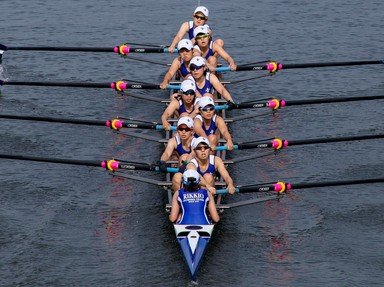Quiz Answer Key and Fun Facts
1. What is a rowing crew competition most often called?
2. What is the main difference between scullers and sweep rowers?
3. What is NOT one of the important jobs of a coxswain during a race?
4. Your adrenaline is pumping as the race is about to begin! Which method is used to start a rowing race?
5. The race is in full swing! What is NOT an important concern for the rowers of a coxed shell?
6. Where does the captain, also known as the "stroke" rower, sit in the shell?
7. Which is NOT one of the four parts of a rowing stroke?
8. In rowing, which strong muscles of the body generate the most power for a stroke?
9. Is it good news when a rower catches a crab?
10. The race is nearly over and the coxswain is losing her mind with excitement! What might she ask the crew to do to finish the race as fast as possible?
Source: Author
BigTriviaDawg
This quiz was reviewed by FunTrivia editor
Fifiona81 before going online.
Any errors found in FunTrivia content are routinely corrected through our feedback system.
